#something something the person who struggles with her identity and finding a place in society growing thru connection to other people
Explore tagged Tumblr posts
Text
i think it would be so funny if before ganyu and keqing reached some kind of understanding, in the pre rex lapis retirement era, ganyu had just a bit of a "i could fix her" attitude towards keqing. not a whole lot, just an occasional moment of insanity. like she can see this woman who is in her eyes arrogant, self assured, overconfident, and blatantly ignorant, someone who doesn't appreciate what their god has done for liyue. but at the same time she clearly cares about the nation and works hard to maintain and improve it. her heart is in the right place and that has got to be more frustrating than if she was irredeemable. more complicated. and ganyu seems to be the type of person who wants to see the good in the world and in people
like she'd have moments of thinking maybe she's ok. maybe she just needs to grow a little as a person and she'll come to her senses. but then keqing gives a banger passionate speech abt her beliefs n ganyu's like nope what was i thinking that's a lost cause right there. and the cycle continues. keqing in her lane flourishing while ganyu is having a Time with this funny politician living in her head rent free
ironically in the end ganyu ends up growing a lot herself as they reconcile their differences and become closer. tho keqing's had her own growing to do. without anyone needing to fix her lol. learned her own lessons. something something the kind of person liyue needs right now also being the kind of person ganyu needs
#is this anything. am i making sense#ganqing#something something the person who struggles with her identity and finding a place in society growing thru connection to other people#while the person whos defined by her ideals growing thru the challenges her own ambition presents#and them both growing by learning from each other !!!!!#man. ganqing is so cool#i wrote most of this while numbed by sleep deprivation at 3 am but i still think im right
50 notes
·
View notes
Text
It's hard not to find irony in the criticisms directed towards Eloise Bridgerton and the elevation of Penelope Featherington as a more genuine and hardworking figure in contrast with Eloise's supposed privileged circumstances and her discourse on feminism. Indeed, some voices have pointed out Eloise's feminism as something white and privileged, and while this is not without merit, it's akin to rediscovering what others have already noticed, akin to Christopher Columbus "discovering" America.
Understanding the context in which "Bridgerton" unfolds is essential. The series is set in Regency England, between 1813 and 1825. This historical period is marked by a highly stratified and conservative society, where women, especially those of the upper class, were relegated to traditional roles and lacked basic legal rights. In this context, any discussion of feminism must consider the unique limitations and challenges of the time.
It is true that Eloise Bridgerton, being part of a respected family in English nobility, embodies many of the characteristics associated with the white and privileged feminism of the time. However, this should not diminish the value of her role in advancing feminist ideas in her historical context. It is thanks to women like Eloise, who challenged social expectations and dared to question the status quo, that doors were opened for future, more inclusive feminist movements.
On the other hand, when analyzing Penelope Featherington's role in contrast with Eloise Bridgerton's, intriguing nuances worthy of a more detailed critical exploration are revealed. Although both come from upper-class families, Penelope's experiences differ significantly from Eloise's. In the society depicted in "Bridgerton," Penelope is portrayed as a more marginal figure, overshadowed by the prominence and glamour of the Bridgerton family. She is often seen in the background, struggling to find her place in a world where her social status does not put her at the center of attention.
Throughout the series, Penelope exhibits a distressing lack of empathy and solidarity towards other women. Instead of fostering unity and support among her peers, her writings are propelled by feelings of envy, resentment, and desires for revenge. Striking examples of this include her actions to publicly reveal Marina Thompson's pregnancy, intending to undermine her relationship with Colin Bridgerton, or defaming individuals such as Daphne, Edwina, and Kate Sharma, often with no apparent reason other than personal gain.
Penelope's behavior as Lady Whistledown sheds light on her complex nature and motivations. While it may represent an attempt to find her voice in a world dominated by more powerful figures, it also reveals a tendency towards manipulation and selfishness. Ultimately, her role as the mysterious chronicler is more than just a quest for identity; it is a reflection of the moral and ethical complexities underlying the society of "Bridgerton."
In summary, asserting that Penelope is more feminist and hardworking than Eloise due to her role as Lady Whistledown is, at best, simplistic and, at worst, deeply misleading. Both women, while privileged in their own right, have chosen different paths in life and have faced their own challenges. However, the narrative of Penelope as a morally superior and more genuinely hardworking figure should be questioned in light of her actions and motivations, which often reveal a lack of integrity and empathy towards her peers.
It's important to note that when Theo confronts Eloise, questioning her understanding of the real world and her privileged position, Eloise doesn't reject this criticism but uses it as a catalyst to seek greater understanding. Recognizing the validity of Theo's observation, Eloise actively seeks to broaden her horizons. She engages in conversations with Theo and John, seeking to break free from the bubble of privilege in which she has lived so far.
On the other hand, Penelope takes a different stance towards her own privileged position. Instead of acknowledging her situation and seeking to understand the realities of those less privileged, Penelope vehemently denies any suggestion that she also benefits from the system. Rather than accepting her position of privilege, she portrays herself as a victim, despite her actions suggesting otherwise. Ultimately, this divergence in attitudes between Eloise and Penelope highlights the complexity of individual perceptions of privilege and personal responsibility in an unequal world.
PS: The comment: "Penelope saved Eloise by writing that she hung out with radicals, she doesn't know what it's like to be grateful" is shit. Whose fucking fault is it that the Queen is on a crusade with torches and pitchforks, looking for blood and a rolling head? From Penelope because she doesn't know when to keep her hand still and stop writing, if it weren't for Penelope, the queen wouldn't think that Eloise is Lady Whistledown, Penelope wasn't looking to help Eloise, she was looking to save her skin.
#anti penelope featherington#penelope featherington#eloise bridgerton#the bridgertons#bridgerton#theo sharpe#I swear I'm going to cry if I read again that Penelope is an icon of feminism and women's empowerment#Eloise does not deserve all the hate they are giving her#I do want Eloise and Theo to be together forever.#Because they love each other and would be very happy together#marina thompson#madame delacroix
579 notes
·
View notes
Text
Jinx's haircut: how Powder and Ekko's story comes full circle
Hi! So, it appears Jinx will be cutting her hair short in season 2 (which is cool as fuck), and I’ve been seeing a lot of discussion on it, so I wanted to share my two cents 😊
I might refer to Jinx and Powder as if they are different ideantities, but I'm aware that's not how that works; it's just an easier way to express myself. Also english isn't my first language, so apologies for any possible wiritng mistake (this is a bit of a mess 😅)
* deep breath in *
As it has already been pointed out, this choice must have a deeper reason other than esthetic (I've been seeing the phrase "hair holds memories" used a lot), and what's even more interesting is that her new look resembles a lot how she used to look like as a kid; a bit bizarre, given how the entirety of season 1 showed us how Powder and Jinx's coexistence only brings the girl pain. As a matter of fact, the finale makes it clear to us that even she sees these two sides of herself as mutually exclusive.
So why and how exactly would this happen now?
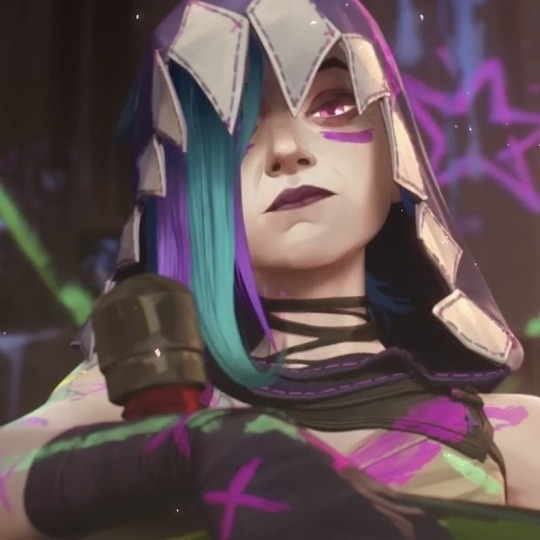
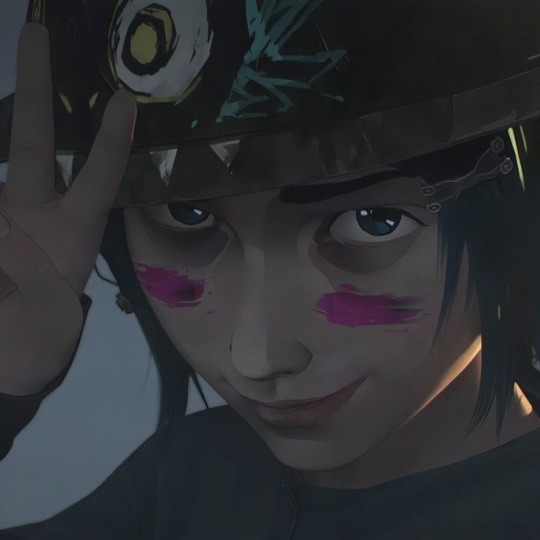
What I keep going back to is the idea that maybe, just maybe, this has to do with her possibly "taking the lead" in Zaun; whether she actively becomes a leader or if she just "leads by example" (therefore passively), it doesn't change the fact that for better or worse she will be depicted as a leading revolutionary figure.
And fair enough: she singlehandedly killed half of the Council, the people who hold decisional power and have contributed to the misery on the other side of the river. After Vender's failed attempt on the bridge and Silco's focus on his own business dealings with Piltover among everything else he did, Jinx's attack on the city - something she does to ultimately solidify her identity as Jinx - opens a door that the Undercity was waiting to be opened for decades.
Here's the thing:
Being Jinx doesn't just mean acting on unbridled rage and being a menace to society; it means being feared by most, if not all, with the only possible exceptions being those who also accepted their inner monster. To put it in Singed's words, "If you take this path, they will despise you".
Being Jinx fundamentally implies loneliness.
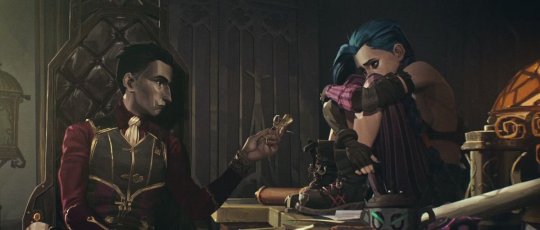
Silco was consistently reminding her this: "I am your family; everyone else betrays us" / "Everyone betrays us Jinx! Vander! Her! They will never understand, it's only us".
In the official clip 'Enemy of my enemy' we find out that he only saw her cry twice, the two scenes we also witness as an audience, meaning he didn't see her cry once during the timeskip, and I'm sure it's safe to say that she most definitely did cry a lot given how she goes from episode 3 Powder (scared, couldn't grasp the concept of killing someone, heartbroken by the nickname jinx) to episode 4 Powder (a beast, kills in cold blood, has taken Jinx as her actual name)... it must've been an ugly transition, and it definitely didn't happen overnight; if Silco, who was the closest person she had all that time, didn't see it, then I think it speaks a lot on how alone Jinx really was in her darkest times.
For all the love he had for her, he reinforced this idea of isolation as an unescapable consequence of the right path, and I think this is also reflected in the lair that (supposedly) he found for her, especially when you compare it to the Firelights’ one:
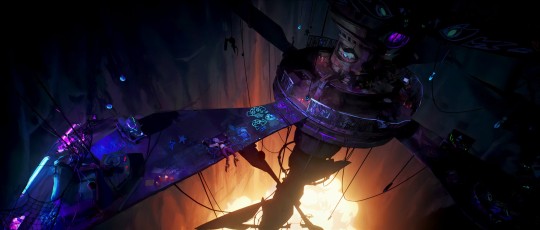
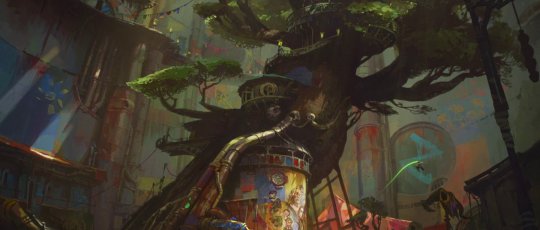
The Firelights (this is important for later) are all about community and sharing joy as well as struggle and pain; they live in a place of healing, filled with life, without a roof so the sunlight can reach them during the day, and at nights living bugs that shine a light of their own fill up the hideout.
Jinx's place is diametrically opposed to this: it’s dark and looks cold, it's completely made of metal, the roof’s blocking any natural light and it hangs above an abyss with no bottom to be seen; the only company she consistently has are the puppets of her dead brothers and the only living thing that knows his way in is the only one that can understand, the only one she can rely on - aka Silco himself.
However, as Jinx herself knows, this may have worked for him, but it wasn't working for her for the longest time: she never stopped yearning for affection, love, friendship- that part of her never really went away; it was only being suppressed, suffocated, maybe unintentionally, and I strongly believe that it only worsen her trauma, and it's one of the things that made her spiral so bad into her depression, to the point of hallucinating.
I think that Silco's line in the baptism scene is particularly relevant here: "You need to let Powder die, so the fear of pain will no longer control you", where the fear of pain would refer to the fear of being on her own, of always failing and disappointing others, of being weak and never satisfying the desires, expectations, hopes that Powder carried within her to be “a valuable member of the team”.
If she lets Powder die (which again, she does in the final episode of season 1), this is no longer a problem: if she doesn't do teams, because teams don't want a jinx to begin with, that fear can't get to her; if she's a solo player, a self-sufficient loose cannon, she won't need to rely on anyone but herself because she's strong on her own and does not need the support of others.
If her power lays in the monster she is, the one everyone condemns her for being, then that childhood wish of hers just isn't a realistic option.
...but then this happens.
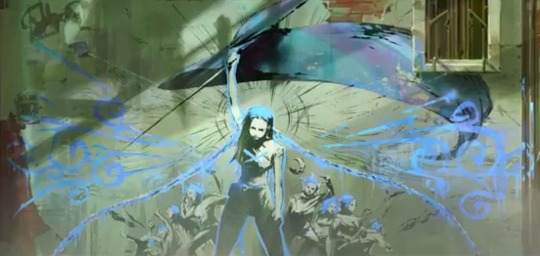
We know from the teaser trailer that in the operation Caitlyn's leading, 'finding Jinx' and 'neutralize any agent still loyal to Silco' are separate objectives. Which makes sense, since as far as they know Silco was the leader of a group of people, and now that he's gone Jinx is an individual under her own agency and her own agency alone. If initially she fights by herself, for herself because she can and fuck Piltover, then it all falls in line with what I stated so far.
But then we hear Sevika, who has hated Jinx's guts and who Jinx has hated back since day one, telling her to get the people together, to unite the Undercity as one because she can do that. Mind you, the girl has lived in Zaun all her life, she knows damn well that the end of Piltover is something the entire Undercity has been waiting for (“Imagine what the whole of the Lances could do!” from episode 2); yet despite this she needs to be openly told what is going on, that she’s not sizing the opportunity she’s created. She isn't, cause... her? Leading? A group of people? No. Not after the last time she tried to help, and most importantly, not after everything she learned under Silco.
Jinx can't fathom the idea of herself as a part of a part of a team. How can she? She literally just came to terms with isolation as ever present- and now, for some reason, the people of the city, who always either ran away from her or wanted her gone, are dying their hair blue in her image, trusting her, following her, painting murals of her as the bringer of revolution.
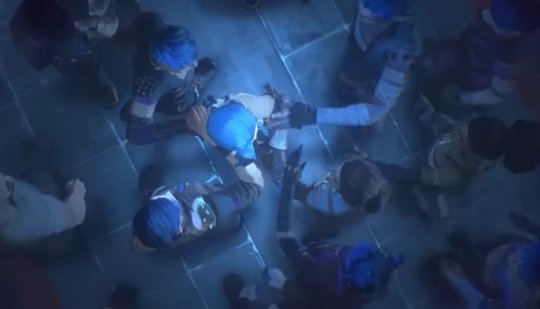

She isn't taking power forcibly like Silco did; she's just doing her thing, her Jinx thing, and Zaun, on its own, is choosing her as the leading figure.
Imagine how frustrating it must be for Jinx to look back and realize that Silco, her father- who has loved her, forgiven her, raised her, called her perfect, defended her, was there for her, saved her, guided her- was wrong, and put her in a condition of never ending existential pain when she could’ve had it differently the entire time; imagine how confusing it must be for her to look back and realize that it never mattered whether or not others understood her, 'cause she wasn't as unlovable or unforgivable as she thought herself to be in the first place, that Silco and Vi were never her only options.
Imagine how painful it must be for her to look back and realize that for all this time she could’ve had friends and be accepted and be trusted and rely on others because she never HAD to be alone.
...keeping this in mind, let's talk about Ekko and the missing flashback from episode 7 for a moment.
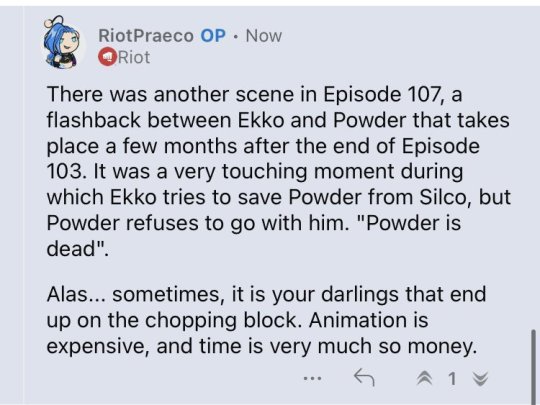
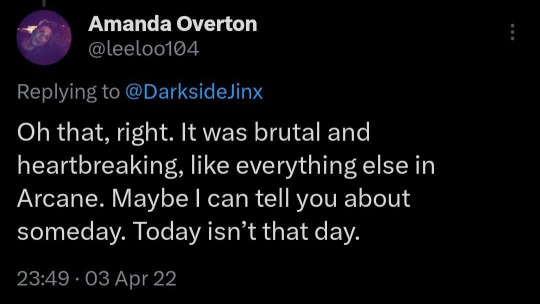
Admittedly we don’t have a lot of information, other than it took place not too long after the events of episode 3 (then again, to be fair, we don’t know a lot about their relationship as enemies as well: it’s all between the lines; I surely have my own opinions of how they feel about each other being on the enemy side, but I don’t believe it’s super relevant here). What’s for sure about this flashback is that it was a defining moment in both Ekko and Powder’s journey, especially for the latter. Someone surely died, and it 100% was Powder’s fault. It could be both the result of her very first crisis or her first intentional murder; in both cases it results in her deciding for herself to align with Silco as opposed to her best friend.
The way I like to see it is that, since the trauma was still very fresh, she might have been too scared of the idea of fighting alongside others after what happened last time, and she pushed herself to kill someone on purpose just to push Ekko away and prove a point (Silco’s point). I love the idea of the tragic irony of Ekko being the one person Powder managed to really save, and Powder being the one person Ekko couldn’t.
Personal headcanons aside though, the last part is the most important one here: Ekko couldn’t save Powder from Silco, and by extension everything he represents.
I’d like to point out that one of the most tragic aspects of the two becoming enemies (to me) is that, throughout those years, they reciprocally were the only living person the other shared a past with (well, Vi too, but she was in prison the entire time).
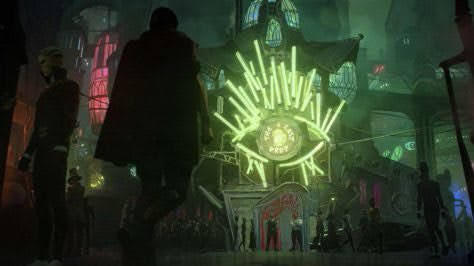
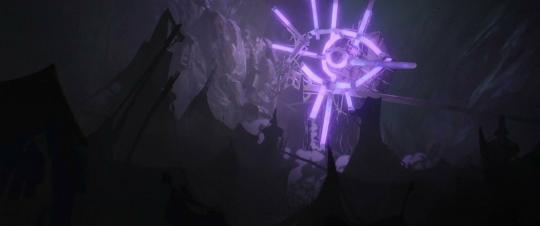
Silco not only takes over by force, he also marks as his all the places of said past: the Last Drop, Vi and Powder’s house… one line that always stuck with me from episode 7 is when Ekko tells Vi “All that’s left is Jinx, and she belongs to Silco”.
Not with Silco; to Silco. As if she too a piece of the past he turned into his property.
It’s like he understands that while yes, Powder made the decision by herself, that she wants to stay with Silco, he also knows that the man is the one to blame for... well, all of it; the kid was there when Silco showed up unprovoked at Benzo’s place, he knows things went downhill from there.
Ekko knows that he is the bigger problem and the bigger enemy. Even Vi, without knowing a thing about the past few years, can tell Silco put some shit into her sister’s head; Ekko can probably guess the same, difference being that Ekko has the responsibility of keeping other people safe, and he can’t risk it all for someone that, while possibly manipulated, ultimately isn’t collaborative. Ekko can’t jeopardize all he’s built and done for his former best friend, no matter how much it hurts him to be her enemy.
Back to season 2.
Like the entire fandom has already pointed out, there’s a 99.9% chance there will be an alliance between them and Jinx, especially when looking at Ekko’s new outfit.
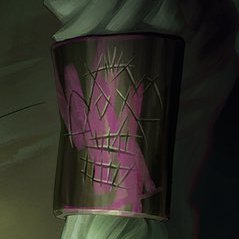
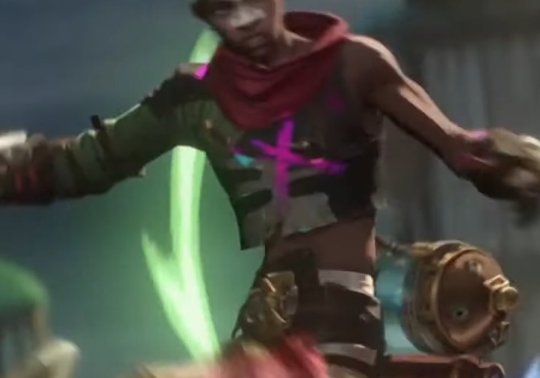
Of course, this will not be immediate: my guess is that while Jinx works alone at the very start Ekko will be with Heimerdinger and following the arrest of the Firelights we see in the trailer maybe there’s a split. And even after Jinx takes charge so to speak, and possibly frees them, among others, from Stillwater, it’s possible there will be (and there should be) stages in the alliance: initial distrust, potential fight within the community- like yeah, let’s not forget what Jinx did to these people.
Even if they do go ahead with it, it is probably out of necessity more than anything else, with not one but two military forces against the whole of the Underground. It’s not like they’d be the most ecstatic faction about it, and the same goes for Ekko, which is why the new look will probably come in later.
But exactly like he could see Powder for a brief second on the bridge clearly enough for him to stop himself from beating her, he will, most definitely, see her again through Jinx's inner turmoil... that, and she also can’t keep her shit together when it comes to what she's feeling, the girl really is an open book.
And yeah, the situation would be pretty emotionally disorienting: she's being as Jinx as ever, but people like her now, which is something she used to want as Powder, who is supposed to be dead, and they're willingly following her like they willingly followed Vander and there's murals of her with him, though she's pursuing what aligns more with Silco's dream, but also turns out Silco was wrong about Powder, who might still be alive deep down- the whole thing is a big big mess.
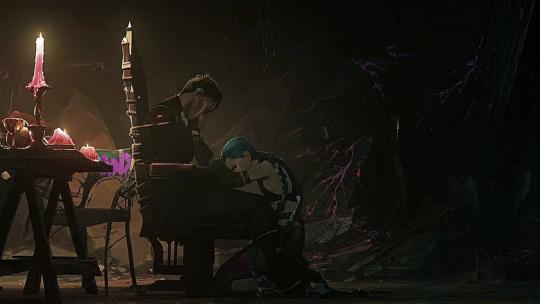
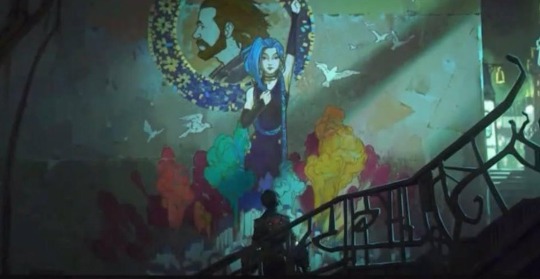
Despite everything that I said about him, it’s not like Jinx would start to resent Silco. She could never, not after his last words to her. They mean the world to her, he means too much to her, and let’s not forget she probably hear his voice now too, along Mylo’s and Claggor’s; it might even be a calming voice to her, one she’s happy to hear even if she knows he’s not real… which makes it all worse and more painful to deal with.
In this scene from the trailer, it seems like Ekko’s talking to her (some have pointed out the blue hair out of focus). Since this is still the look in season, at this point in time Ekko (and the rest of the Firelights) are not truly committed to this alliance with Jinx, and vice versa, Jinx is still figuring out how to deal with all this unexpected appreciation.
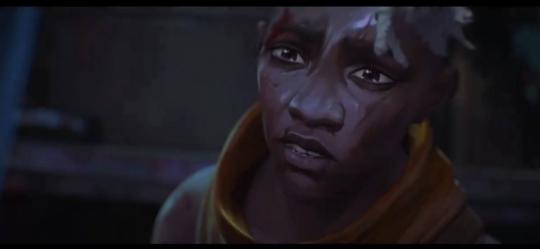
If there’s one thing we’ve learned about Jinx’s way of dealing with inner conflicts, especially ones that deal with the memories of the past, is that it often leads to disaster. This is a bit of a long shot, but what if the reason Ekko’s so beat up Is because she unintentionally sabotaged one of their own attacks on Piltover? Or perhaps they were caught up in a tough situation because of something she did or didn’t do? My point is that if he really is talking with her while in this condition, she probably is in a similar one.
Regardless, they are on the same side, and they are having a conversation. This is very likely the first time they reach out for each other since the day she chose to not go with him.
And I think it’s believable that of all the people she now has beside her, she’d talk to Ekko: he has this leader stuff already figured out. He has and still is taking care of people and keeping them safe better than she ever will, and on top of that, he still is the only one in Zaun (again, aside from Vi) who has known her since before she was Jinx, and he spared her on the bridge. He’s the perfect person to open up to.
And, get this, not only Ekko understands the pressure of taking the lead: he knows what it means to look back at someone you were fond of and feeling the pain of being wronged by them. He knows what it’s like to look back at old memories of someone you trusted and wonder if all those moments together really were what you thought they were, he knows what it’s like to wish it could all go back like it was, just so that candid version of them you have in your mind can still be true, present and untainted by the ugliness that now ruins all those precious moments.
He knows, 'cause he went through it with her... and now he can finally reach her.
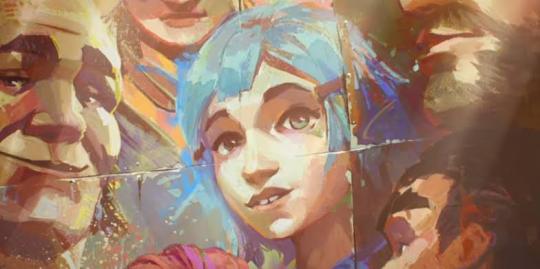
Ekko may have not been able to save her from Silco then, but he can save her from Silco now.
And since he has built a community that grieved together, went through pain and joy together, he simply does what he’s always done with the Firelights. Sharing.
He tells with her what has worked for him: “Sometimes, taking a leap forward means leaving a few things behind”- in the Franch dub he says “leaving a part of oneself behind”- meaning it doesn’t have to be all or nothing: she has the power to choose what to kiss goodbye and what can stay…
…and then she cuts her hair.
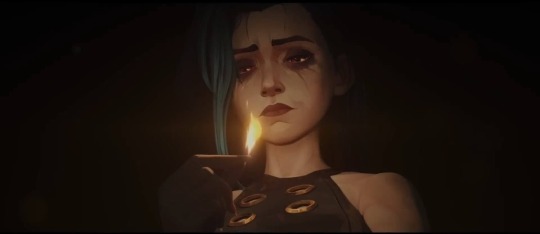
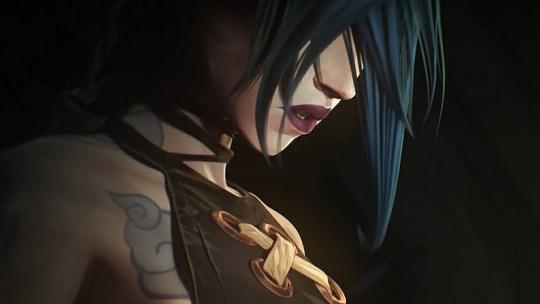
I think it’s important to note how these two moments are very similar in setting. I kid you not, the first time I watched the trailer I was convinced this was a scene where Jinx was burning Silco’s body after she killed him- which frankly could still be the case. I’ve also seen discussions being made for the little girl we see in the trailer being burned here, or Sevika, but I don’t think it’s either. Jinx is completely desensitized to death, even when Silco died her makeup isn’t this ruined. My guess is that this is something much deeper:
Jinx never properly grieved the past. Ever. So, maybe, she’s burning the part of herself she’s leaving behind. The hair she cut.
The hair Silco used to braid for her.
These two scenes parallel each other because “nothing ever stays dead”, but Silco must stay dead, for her own sake. For her own happiness: she is leaving him behind for good.
Only after this moment we get the new look for Ekko: he can work with this new Jinx, the one that now knows she can work within a team, even to the point of committing to the outfit (lol).
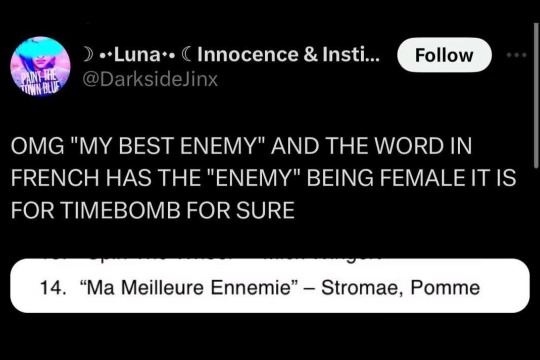
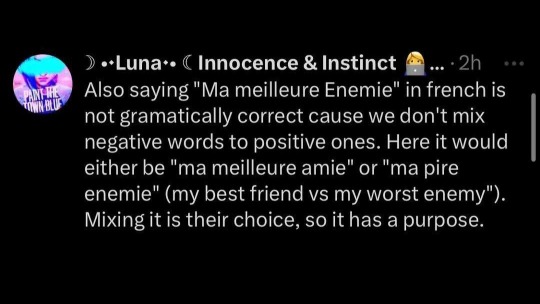
If in season 1 Jinx accepted her identity as it was defined by Silco, in season 2 she's re-inventing it under her own conditions: she gets to choose what "being Jinx" may or may not include. And it will always include a little bit of Powder.
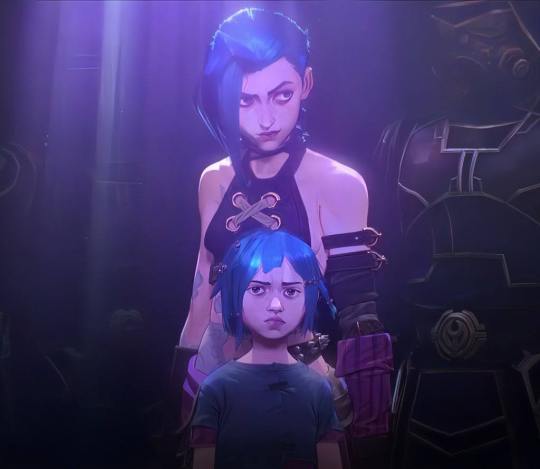
Thanks for reading! 💚💙
#or I could be completely wrong#and someone just cuts it#but still#it was fun to write this#arcane theory#except not really#arcane#arcane season 2#jinx arcane#ekko arcane#arcane silco#powder#timebomb#i ship it#but this also works platonically
116 notes
·
View notes
Text
Why am I obsessed with the rift?
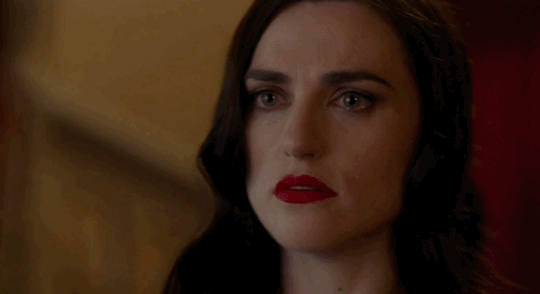
From my first fic to the many many many many season 5 fics I've written, to the fic where the whole thing could've been averted in season 2, to my no-villain-era-for-Lena in season 3 (twice) and season 4 fics......... I seem to have developed a bit of a rift pattern.
A reasonable person might ask: Why?
There's something that itches in my mind: I think either woman would've been fully justified in walking away from their friendship, and yet they ultimately didn't.
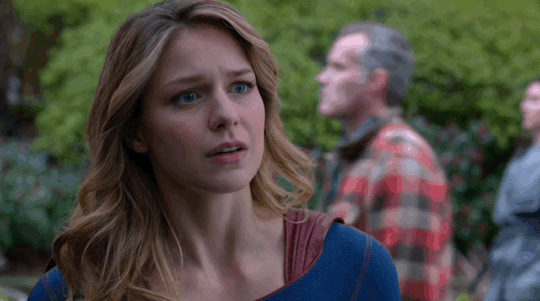
It starts with Kara, who is ultimately a fractured person. She deeply values the truth, and yet she's forced to live with various lies, unable to be her full self.
Her identity is in the in-betweens. She feels adrift between two cultures, she knows her alien state while reaping the privilege of passing, she hides core aspects of herself on a daily basis. I'm sucked into the rift, in part, because of who she is and how she struggles to put it all together. I think her frustration will resonate with anyone who's stuck in the in-betweens.
Kara's struggle for identity plants the seed for the rift. The bigotry of society meant she had to have a secret identity in the first place, and keeping the secret from Lena was certainly reasonable for a time.
We can debate endlessly about when Kara should've told Lena - I think it's really hard to find the line between "too soon" and "too late" - but it ultimately doesn't matter. Because it's Kara's kneejerk reaction to Lena's kryptonite that forms the first sort of betrayal, not the secret itself.
Kara screws up - she says something she regrets, she doubles down when threatened and scared. These are common mistakes... but we have super-level circumstances, so we get super-level consequences. And the engine she has inside her that fears loss (which she's suffered to a level that is unimaginable to anyone on Earth) kicks in. She can't lose another person she loves.
But who is she holding onto?
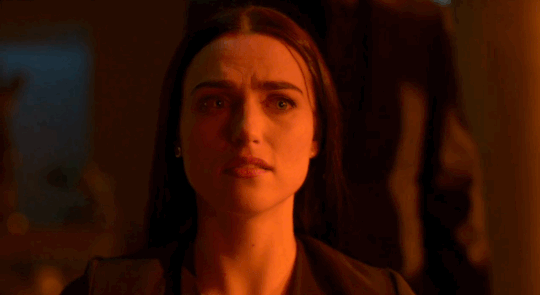
In the series, and in flashbacks, we watch Lena's progression from idealistic techie to cynical recluse. While she's experienced loss and isolation, that's not the cause of her shift.
It's in experiencing her idol and protector become the madman who kidnaps her. It's in realizing her best friend has betrayed her by taking the one thing that could've saved her brother. It's in moving to a new city to start over, and meeting a mentor who uses her to start a global invasion. It's in her partner in scientific discovery being a pawn to her brother, colluding behind her back.
And then there's the final downfall. Her new best friend - her trusted confidant, her hero, the one who made her feel not so alone anymore - is the super who denigrated her, maligned her, spied on her. Lena had two important people in her life at that point, and she sacrificed one for the other... only to find out the other was a lie.
With betrayal after betrayal - Lex and Andrea and Rhea and Eve and Kara - she loses faith that anyone is above their worst impulses.
So she falls to her own.
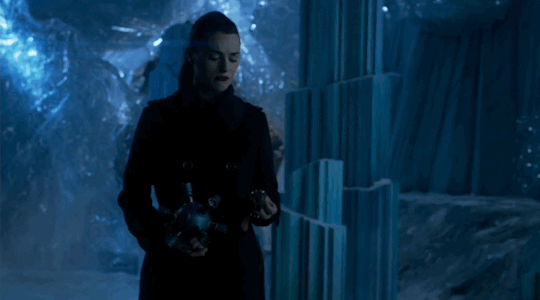
How can good people do bad things?
There's a saying I heard around MIT sometimes: there are no technical solutions to social problems. It's easy to forget - when you're surrounded by people seeking to improve the world via science and engineering - that you can't solve humanity via technology or logic or rules. Lena forgot this.
Myriad marks a shift in the rift. Kara lied to Lena, antagonized her, spied on her - but her wrongs were directed towards Lena. Lena's initial response - the petty manipulation and the plan to out Kara - were directed back at Kara.
But then the rift fundamentally shifts.
At this point, Lena's wrongs are no longer just about Kara - she's trying to brainwash the world. She mindcontrolled Malefic and enslaved Eve. This went beyond the fallout between two friends.
It's clear that her intentions are still good here. She's not a megalomaniac like her brother, she's not forming an us-vs-them mentality like her stepmother. She's an anti-villain at this point in the story - desperate to find what's true, in a world full of lies.
It's a hard line to walk, acknowledging Lena's trauma and well-intentioned motivations while realizing she's still ultimately culpable for her own actions. But it's important to try to balance, because Lena is still redeemable.
But getting back to the relationship itself - Kara played a large role in pushing Lena to the edge of her trauma, which was entirely motivated by Kara's own trauma.
You hide things so you don’t lose people. I run from people who hide things. I guess we were bound to explode.
Lena says this in my first fic mentioned earlier, and it summarizes the rift as succinctly as I can put it. Their traumas were incompatible, and their relationship should've failed.
And yet.
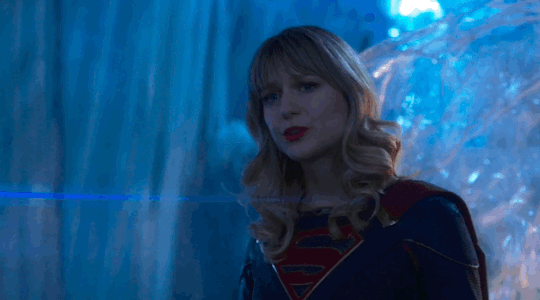
Delving into how the CW screwed up the rift could be its own essay. They gave us a complex and layered situation, only to gut it with It's a Super Life (beloved/beloathed), the narrative retroactively justifying Kara instead of examining her foils, glossing over Lena instead of delving into her ethical blindspots. The rift was cancelled.
What does that leave us with?
Well, I guess it left me seeking the rift, over and over again. I'm certainly not the first author to do a rift fic, and I doubt I'll be the last. There seem to be a few different approaches:
Some authors delve into the nuance, having the two characters hash out what they've been through in a way that feels balanced and real. In particular, I love the @searidings fic with the birds i'll share this lonely view. I don't think I have the skill to pull off that type of story.
Some writers lean heavily on one "side" or the other, often with lots of grovelling. This never resonates with me, because at some point in a relationship there has to be the realization that it's "us vs. the problem", rather than "you vs. me". In my mind, these fics miss the layers of trauma that led to the rift.
Some authors make the rift not matter. If you put the characters through hell and back, the anger will lose its thrust, and they'll be left wanting to heal.
I fall into the last category.
There's a moment from permanence by @itllsetyoufree that I especially love, where - in the aftermath of season 6 - Eliza asks Lena why she forgave Kara. Lena can't answer.
We like to think we're logically driven. But in my experience, forgiveness - and a host of other emotions - never work that way. Sometimes "sorry" cuts it, sometimes it doesn't. A lot of times, forgiveness comes from the realization that someone genuinely wants to connect, and that the fallout was relatively unimportant in the grand scheme of things.
Of course, when your fallout includes extra levels of gaslighting and a bit of global brainwashing, making it relatively unimportant requires something drastic.

That's where I end up landing. Putting my blorbos in Situations helps them see the other in a new light - see the other's genuineness, the other's fears, the other's love. Often times, this comes with the simultaneous threat to someone's life (though that's not necessary, especially if it's earlier in Lena's breaking point cutoff).
I do assume - and sometimes imply - that they're also having those discussions, working things out in the background. Because of what I put them through in my fics, I don't think those end up being explosive discussions. It's about figuring out the practical aftermath of what the heart already knows at that point.
Whether I deliver on that is ultimately up to the reader, but that's my approach. Because at the end of the day, love is about cherishing and understanding the person in front of you - flaws and and traumas in all. These stories are driven by loving both characters, and trying to see them the way they see each other.
The rift is a story about love and connection - how those things can't happen without embracing someone else's trauma and without understanding one's own imperfection. Because that's what's at the root of all of us.
And that's why I write the rift.
#this felt good to finally put into words#(note: this approach made writing the pre-S5 fics particularly rough but that's a tangent that didn't fit in here)#(I don't delve into every ethical question either but I wish the show had)#supercorp#headcanon#mel stuff#sg musings
124 notes
·
View notes
Text
|| “What could've been“||
Draco Malfoy x Pureblood Reader
Soooo my fyp is being all dracotok...again, so I made a Draco Malfoy scrabble^^. Hope you like it!!
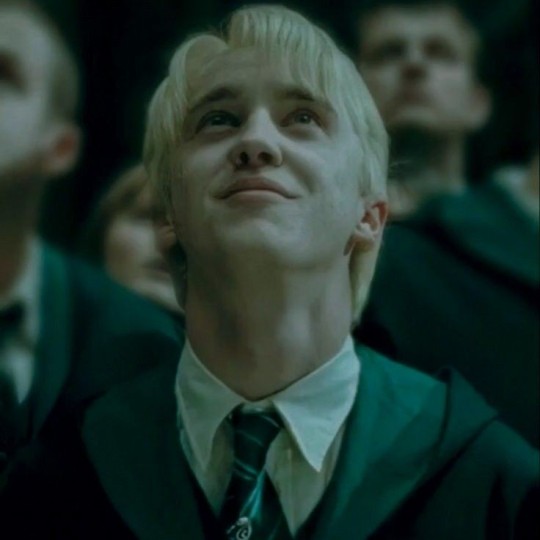
In the heart of wizarding society, where lineage and tradition reigned supreme, Draco Malfoy found himself navigating the intricacies of a world where expectations often outweighed personal desires. Amidst this backdrop, an unforeseen twist of fate introduced him to a captivating individual— Y/N Devereaux —a witch whose presence stood out amidst the polished facade of society.
Their initial encounters were steeped in formalities, exchanged pleasantries, and the rigid expectations of their families. Draco, with his familiar air of aloofness, and Y/N, graceful yet quietly defiant of societal norms, found themselves repeatedly crossing paths at various wizarding events.
At first, their interactions were confined to polite conversation, laced with the weight of their families' histories and the unspoken rules of their society. Yet, beneath the surface, there brewed an unspoken connection—a shared understanding that transcended the boundaries of their predetermined roles.
Y/N possessed a depth that intrigued Draco—a mix of resilience, intelligence, and an unwavering spirit that refused to be constrained by societal dictates. As Draco navigated the complexities of his own beliefs and the expectations placed upon him, Y/N's presence served as a gentle reminder of a world beyond the confines of tradition.
Despite the pressures surrounding them, a subtle shift occurred in their dynamic. Casual encounters turned into purposeful conversations, filled with shared laughter, moments of vulnerability, and glimpses of their true selves beneath the masks they wore for the world.
Draco found himself confiding in Y/N about his inner conflicts, the weight of family expectations, and the struggle to define his own path amidst the stringent guidelines set by his lineage. Y/N, in turn, shared her own aspirations, fears, and dreams—unveiling a side of herself that she rarely revealed to anyone.
As Draco and Y/N spent more time together, they discovered common interests and an unspoken understanding that blossomed into a genuine connection—one that neither could ignore nor deny. Their journey together wove a tale of finding solace and understanding in a world that demanded conformity.
"Another one of these insufferable gatherings. The same faces, the same pretenses."
"It can be tiresome, indeed Draco. But sometimes, within the monotony, there might be hidden moments worth discovering."
"Hidden moments? In a sea of shallow conversations and forced pleasantries?"
"Perhaps. But sometimes, beneath the expected facade, there are depths waiting to be explored you know."
Their conversations, once formal and veiled, gradually shifted to deeper topics, their words weaving a connection beyond the surface. Each encounter revealed more layers, unraveling the complexities of their personalities.
"I've never understood these traditions. They suffocate individuality, force us into roles we didn't choose."
"Traditions often clash with the desire for authenticity Draco dear, But within those constraints, there might be room to shape our own paths."
"You speak as if there's a way to break free from these chains love." He said, as he walked towards her, grabbing her hand and kissing it.
"Maybe not break free entirely, but navigate them in a way that lets us remain true to ourselves, You know that Love." She said as she carresses her love's cheek.
Their conversations, once tethered to societal expectations, ventured into contemplations of freedom and identity, fostering a mutual understanding of their shared struggle against the confines of their world.
"There's something different about you. You don't conform to the mold everyone expects."
"And neither do you, Draco. Beneath that exterior lies someone wrestling with their own desires and beliefs."
"I never expected to find someone who sees beyond the Malfoy name."
"Maybe that's because I look for the person behind the title, beyond the expectations."
Their dialogues, once laced with formality, evolved into honest exchanges, each word strengthening the connection between them.
"I've found comfort in our conversations,Y/N. I found comfort in You. You make these events bearable."
"You've provided solace for me in this world of constraints, Draco. Your perspective challenges my own. And I love that about you.“
"Perhaps there's a chance for something more between us."
"Maybe, in this world of rigidity, we've found a space to explore what could be."
Their talks, once cautious and restrained, hinted at a shared desire for something beyond the limitations of their circumstances.
Their journey together continued, conversations evolving from polite exchanges to shared confidences, laughter, and whispered hopes for a future where their love could thrive. Amidst clandestine meetings and stolen moments, their connection grew stronger, defying the boundaries imposed by their families and society.
Their love blossomed amidst clandestine meetings, stolen glances, and whispered conversations away from the prying eyes of their world. They navigated the delicate balance between their burgeoning affection and the pressures of their families' expectations, determined to carve out a path where their love could thrive.
In the end, what began as chance encounters in the meticulously crafted world of wizarding aristocracy evolved into a profound and unexpected love—one that dared to challenge tradition and rewrite the narrative of their predetermined lives. Draco and Y/N stood united, their love a testament to the resilience of the human heart against the confines of expectation and tradition. Together, they forged a future that honored their love, breaking free from the chains of society to embrace a life where their hearts could truly be at peace.
#draco malfoy#draco x reader#draco lucius malfoy#draco imagine#draco malfoy imagine#draco malfoy fanfiction#draco fanfiction#draco fic#draco malfoy x reader fluff#draco malfoy x reader#draco x reader fluff#draco malfoy x oc#draco malfoy x you#you x hp#harry potter draco malfoy headcanon#draco malfoy x self insert#_kyozume
196 notes
·
View notes
Text
Benedict Bridgerton & Freedom: A Character Study
I think many would agree that Benedict Bridgerton's storyline in season 3 so far has been rather stagnant, potentially deja-vu-inducing. Benedict pursuing an unconventional love interest is nothing we have not already seen from the series. But despite the cyclical nature of Ben's plot, it could suggest more about his characterization (more specifically, his subconscious desperation) than what first meets the eye.
Art & Societal Detachment
Much of Benedict's plot in seasons 1 and 2 revolved around his relationship with art. Symbolically, art is a means of escape from the real world, just as it is a means of interpreting that world or one's place within it. Since both Colin and Benedict struggle with society (in similar, yet still different, ways), it only feels right that Colin feels a personal connection with writing while Benedict expresses himself through art.
It goes without saying that Benedict has poured his soul into his artistic pursuits; it is a part of him, and so naturally the revelation that Anthony bought his place in art school is a massive blow to his self-confidence. Colin experiences something similar: it's as if both brothers are struggling with this question of what it means to be themselves, not merely "Bridgertons" (side note, but the series title is interesting to me in that it calls upon the family's reputation, despite that reputation creating conflict in so many of the characters' stories).
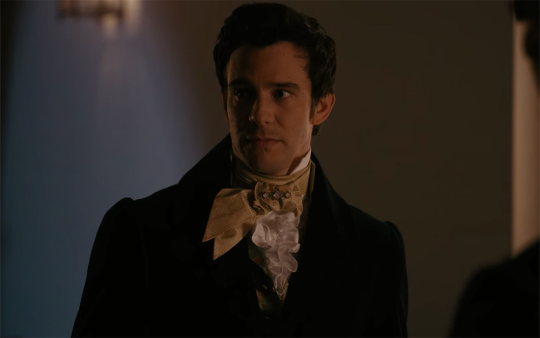
Benedict makes several comments throughout the show that serve other characters' plots, but they speak so much to how he sees the world. For example, in S2 he tells Anthony:
"Poetry is the art of revealing precious truth with words."
By suggesting that poetry "reveals" something else, Benedict is implying that the world is made up of concealed truths. In other words, art is a means of seeing the world (and society at large) more clearly. Which brings me to...
Freedom (& Tilley Arnold)
Season 3 Benedict feels purposeless. The promotional material has indicated as much, and we saw it early when his only means of fulfillment (performing Anthony's Viscount duties while he was away on honeymoon) was taken away.
Season 3 Colin rejects society internally but tries to embrace it outwardly. Benedict has played the part himself before, but he's never pretended to enjoy it (see: his dancing at balls this season).
Ben is a rake, but he's not the kind that chases women to build his reputation. Colin was a rake to fit in, but Benedict is a rake because...well, because he wants to be. An important distinction. The similarity with Colin, however, is revealed through a conversation between Benedict and Mondrich.

Benedict views society as a cage outside of marriage. Once one becomes married, they become free. He even uses that word (a season 4 hint, perhaps? Could Ben's next pursuit of 'freedom' be finding the love of his life?).
We know Benedict hates these imposed restrictions. The most fascinating thing is that even when he has lost a huge part of his identity, Ben is still inherently searching for something, someone, to represent that detachment from society that he so craves. It's why he seems so disinterested in courting--why he runs anytime he is forced into the "societal" box. He is subconsciously searching for anything that removes him from this box...and who better than a bold, unconforming widow?
In my eyes, if Benedict falls in love with Tilley Arnold, that ultimately says more about him psychologically than any true bond between them. It is the idea of her that he falls back on so strongly after the blow he's suffered losing his art, the one thing that made him feel whole. She's temporarily filling a void.
Masquerade
Last point--the symbolism of masquerades. It's an interesting contradiction that concealing one's physical identity is actually exposing one's inner identity. That is to say, the writers have a chance to play with these ideas--self-expression, freedom, facades, escapism, etc.--at the masquerade ball (whenever we see it). It's such a poetic representation of what Benedict is searching for. I'd argue it's almost all subconscious at this point. Benedict seemed so sure of himself when he had art, but now the tables have turned on him--he's like Colin in S2: purposeless. The brothers' stories mirror each other, but the resolution of their problems is unique.
Here's hoping the showrunners/writers take advantage of the opportunity to do something more with Benedict's character in the second half of season 3. And fingers crossed this is all gearing up for Benedict as S4's lead. Seeing Colin in the spotlight in S3 presents a nice comparison with Benedict's own struggles.
#bridgerton#bridgerton season 3#bridgerton s3#benedict bridgerton#benedict#colin bridgerton#Bridgerton meta#benophie#luke thompson#luke newton#bridgerton season3#meta#bridgerton s3 spoilers#benedict x sophie#bridgerton series#bridgerton meta#bridgerton analysis
95 notes
·
View notes
Text
Wolf Children and Struggling with Identity
Wolf Children is not only the story of a single mother trying to raise her kid as best as she can after the death of her lover, but also about two kids who struggle with trying to figure out their identity when society tells them that half of who they are is wrong. Although Yuki and Ame’s wolf heritage is not something they chose and certainly not something they should have to hide or be ashamed of, Wolf Children shows us how society’s discrimination against anything that is “different” make people like Yuki and Ame feel as though they have to change who they are to get accepted by society.
We first see this kind of discrimination with Hana’s lover, the Wolf Man. When he tells her the truth about who he is, it is clear that he has accepted that his wolf heritage will always make him inherently “lesser” than the people around him. In leading up to his reveal, he refers to himself as a “what” and not a “who,” dehumanizing himself right off the bat. He said that he had come to terms with the fact that his wolf side was likely something he would always have to hide, and that he had just accepted the fact that he would always be alone because no one would be able to accept him for who he was. After telling Hana who he was, he even expected her to break up with him, to be scared of him, to completely walk out of his life. However, Hana’s response to his confession highlights just how unfair and irrational such discrimination is: she’s not scared of him because he’s him, and she knows him. She does not see him as his differences, she just sees him as the person she loves.

However, as Yuki and Ame are born, it’s clear that the rest of the world does not share the same mindset. Much like their father, every wolfish part of them has to be hidden out of fear that people around them will react badly or take them away from Hana. When they were both born, Hana had to give birth without any help from a medical professional, in case they both came out looking like wolves. When they want to do something as simple as go on a walk or play around, Hana constantly has to be on guard and make sure they don’t transform and give themselves away. When they get sick, she can’t let them go to a doctor, and when they see other kids playing in the park, she can’t let them go play with them. Even in their own home just being themselves and indulging in their wolfish sides gets them dangerous scrutiny. It gets to the point where Hana even needs to uproot her family’s lives just to live somewhere where they don’t constantly have to hide.

As they get older, Yuki and Ame start to realize just what their heritage means for them and how society treats them because of it. In the books Ame reads he constantly finds wolves being villainized and cast as the bad characters, which upsets him and makes him feel ashamed of the wolfish part of him. And although he learns to embrace that side of him, society does not let him be both human and a wolf, and he feels as though he does not belong or fit in with people. When society criticizes him for his differences, he gives up on finding a place in society. Conversely, when the girls at her school criticize Yuki for her differences, like the way she dresses and the things she finds interesting and all the wolfish habits she’s grown up with, she gives up on that part of herself so that she might fit in with society. They made her feel ashamed of that part of herself and like she was less of a person for being different: Yuki said that she didn’t know how little girls were supposed to act, but that what she did know is that she was doing it all wrong. She told herself that she was going to learn how to behave properly, even if it killed her—and in a way, it did. She did not want to identify with her wolf side anymore, and she rejected it as being part of her, just like Ame rejected his human side.


Although both Yuki and Ame found happiness in the identities they formed and the side of their heritage they chose; it’s sad that society’s inability to accept all parts of them made them have to choose. Wolf Children demonstrates how discrimination doesn’t just harm how others view us, but how we also view ourselves. People should be able to embrace all of who they are without having to worry about how it is perceived, but society’s tendency to discriminate needs to change before that can truly happen.
46 notes
·
View notes
Text

Origin of the Pixies
Fairly OddParents ~ (August 2016 - Ongoing)
"Talk of these things should be reserved for fathers and sons. I'm Head Pixie. I'm your aldra mór, but I'm no one's daddy."
Head Pixie backstory longfic
Drama & Angst (I hear there's fluff in here somewhere...)
First-person POV
Dead Dove
Summary
After being infected with Wolbachia pipientis - the real-life bacteria that causes insects to reproduce asexually - Fergus Whimsifinado soon finds himself a single father struggling to provide for 500+ genetically-identical offspring he never really wanted in the first place. Suddenly becoming the first member of a brand new species means complex politics to deal with, a Pixie World to build, a shipping company and a therapy business to manage, and a budding interspecies war to survive... ... All on top of raising children.
Not Rated; Creator Chose Not to Use Archive Warnings
Read on FFN | Read on AO3
Chapter Recaps | Gen 2 Pixies Sheet
Cloudlands AU - Detailed warnings & other AU info
More Fairly OddParents 'fics
This work has a largely T tone. Borderline M for themes like 'queen bee' insect people fighting to the death, getting abducted by Cupid's family for study, being forced into a will o' the wisp's harem to ensure milk for newborn Sanderson, and general themes of non-human reproduction, child loss, and war.
Head Pixie-centric longfic with a focus on:
- Growing up with freckles in insect society, where you're typecast as a violent "queen bee" who'll stop at nothing to defend his hive. Set Daddy's fortune aside for wergild; you're gonna need it. - Accidental selkie wife addition (Please don't send her back to Mom; she needs this job) - Local party boy struggles to prioritize fatherhood above raves - Getting abducted by Cupid's hot grumpy mom, who's absolutely willing to push you to your limits if it means she can unravel your biology and show you off to all her friends - Raising little worker bees... I mean, drone pixies who regularly need their faces licked for pheromone exposure or they'll cry - Cloudlands' most eligible rich bachelor rejects hugs because he fears bee-instinct cuddle death attacks; more at 11 - Building a company up from nothing. Gotta start somewhere- Why not with cupcakes? (Maybe cute kids are good for something after all...) - Raising an heir you're biologically programmed to kill... It's fine- Sis is raising the spare - Why did we think adopting a cù sìth that can steal your soul if you lie was a good idea? - The cool girl who founded the human godparenting division is afraid you'll hurt her with your big, scary muscles and she'd rather "just be friends." oh no. - WHAT midlife crisis? Hahaha... Don't read Chapter 37. - The war over godkids from "Balance of Flour" (Season 7); H.P. and his 4 eldest pixies are drafted on the Fairies' side. Huh... That's gonna cause issues with the whole "BFF with the leader of the Anti-Fairies" thing... - Divorce? Child loss?? Raising some anti-fairy kid with Anti-Cosmo? Uh-oh. - His hat is also a pen
Read on FFN | Read on AO3 | Blog Tag
"I'm impolite and I make fun of everyone! I'm immature but I will stay this way forever <3" (x)
#Fairly OddParents#FOP#Head Pixie#FOP fanfic#I'm wasp dad trash#We're Pixies!#Cloudlands AU#Cloudlands' most eligible bachelor. He can accidentally infect you so you'll die a rapid and extremely painful death :)#FAIRIES!#ridwriting#Origin of the Pixies#apparently art#ridwork guides#ridspoilers#/slams this one down after holding it for a month b/c I was committed to posting in order- “Let's freakin' GO!”#/fingerguns anyone who read this far in tags and is debating whether to read- On hiatus until Anti-Cosmo backstory 'fic catches up#but not abandoned!! Just waiting for A.C. to reach the war chapters so we can alternate POVs :)#My one regret is... I worry his wing only looks like one to those who know that's the color I use for pixie wing costas but :'D#fic announcement#dead dove#FOP Pixies#FOP Sanderson#Sanderson is neat
21 notes
·
View notes
Text
Recommending novels/books based on your support main! This is literally an excuse just to talk about the book's I've gotten through off my reading list this past week. My asks are open and any/all thoughts or opinions are welcome. TWs for any of the books mentioned will be listed as well. They're under the cut - enjoy!
Ana Amari: Ana used to find reading boring, often passing the time through other means. However, she's always found herself thinking about ‘Women Who Run With the Wolves’ by Clarissa Pinkola Estés. The book explores the wild woman archetype, and explores mythology, fables and fairy tales throughout, helping her to feel some form of escapism. The themes of resilience, feminine strength and intuition make this a book that Ana would definitely recommend to you! Applicable TW/CWs are as follows: sexual assault/violence, trauma, emotional abuse, death and grief, self-harm, mental health struggles, dark or disturbing imagery and cultural sensitivity (some of the mythology may be inaccurate).
Jean-Baptiste Augustin: With Baptiste's natural interest in healthcare/medical practices, the human body, and science with a hint of action and suspense, I think he'd recommend ‘Annihilation’ by Jeff VanderMeer to people similar to him or enjoy his character. It's the first book in the Southern Reach trilogy, and explores an expedition into an area known as Area X; a surreal place where psychological and physical expectations and limits are stretched and distorted throughout the novel. He enjoys the thrill the book provided him, and enjoyed the movie adaptation just as much. It's one that hasn't been able to leave his mind, and he won't stop talking about it when he rereads it every so often or if he's asked about it. Applicable TW/CWs are as follows: body horror, psychological horror, death and violence, suicide, isolation/despair, loss of identity, insanity, and disturbing imagery.
Brigitte Lindholm: With Brigitte's life experiences, and her need to understand other walks of life (and partially because I headcanon her as wlw), I like to imagine Brigitte holds the novel ‘Oranges Are Not the Only Fruit’ by Jeanette Winterson close to her heart, helping to explore her own identity in a personal, retrospective way. The book explores the life of the protagonist with her adoptive, religious parents and her deviation from religion as she explores her identity in Britain. It's a coming-of-age novel that Brigitte found changed her perspective on certain things, and she would recommend it to anyone wanting to read something that's not the standard teenage autobiography. Applicable TW/CWs are as follows: religious trauma, homophobia, emotional abuse, isolation and rejection, struggles with identity and psychological distress.
Illari Quispe Ruiz: Illari enjoys feminist books in my opinion, and enjoys dystopian novels that explore realities possibly not far from her own. It's something she's always enjoyed, with ‘The Power’ by Naomi Alderman being her favourite. She'd recommend it to anyone who enjoyed her character or was similar to her, and her reasons for it are understandable. This novel explores a world where women develop the power to control and produce electricity from their bodies/hands. This causes dramatic shifts in power dynamics within society, and explores the ways in which society would be different for women especially, with the moral questions lingering in the back of the reader's mind. Illari appreciates the outlook the book provides, and the ways in which it poses questions that shake your own morality. Applicable TW/CWs are as follows: sexual assault and r-pe, violence, torture, abuse of power, death and murder, religious extremism, trauma and psychological distress.
Kiriko Kamori: Kiriko enjoys introspection, and enjoys the idea of the afterlife as well as this. It's something she considers a lot, and about the life she'll be leaving behind in the future when her death comes closer. So, she would recommend ‘A Short Stay in Hell’ by William Blackwood to those similar to her or like her character - it explores the idea that hell isn't the stereotypical place with fire and burning, but a version where it's inhabitants have to endure a endless, meaningless and monotonous existence in a bureaucratic afterlife. Kiriko appreciates the way in which the novel sort of pokes fun at bureaucracy in real life/reality, and how much it degrades the human soul to do the same things each and every day. It definitely gave her a midlife crisis too early, but she thinks that everyone should read it at least once in their life. Applicable TW/CWs are as follows: existential dread/despair, psychological distress, administrative and bureaucratic frustration, depiction of hell, isolation and loneliness.
Niran Pruksamanee / Lifeweaver: With the type of person Niran is, he would want to understand other walks of life, and explore realities far from his own but pose questions that relate to his own. He enjoys being left with his own questions about himself, and enjoys having those discussions with his soul about his identity or those around him. It's something he's always enjoyed, with the novel ‘The Left Hand of Darkness’ by Ursula k. Le Guin sparking this especially. Niran would recommend it to anyone with gender or sexuality questions within themselves, or anyone who shares the same passion for understanding humans in fictional worlds. The book explores a reality in which inhabitants of a planet can change their gender at their own will, exploring themes of identity, human connections and empathy. It left a stain on his mind for weeks after he finished it, and he would always recommend it to those similar to him or people who admire/like his character. Applicable TW/CWs are as follows: sexual assault, psychological and physical trauma, gender and identity, cultural/societal oppression, isolation and alienation, death and conflict.
Lúcio Correia Dos Santos: Lucio has values regarding acceptance, community, and finding your place in society with support from others that he always holds dear to his heart. As such, he loves to explore stories with these themes. One of the books he'd recommend to anyone likeminded or those who like his character enough to main him would be ‘The House in the Cerulean Sea’ by TJ Klune. It's a heart-warming fantasy novel about a caseworker who works with magical children, discovering a new sense of belonging and companionship in the process. It's a meaningful book to Lucio, and he loves to talk about it any chance he gets. Applicable TW/CWs are as follows: child abuse/neglect, discrimination, prejudice, trauma, emotional distress, loss and grief.
Angela Ziegler / Mercy: Honestly, I can imagine Angela being a splatterpunk fan, which is a genre that explores the human body's limits in a grotesque, gory and horror-filled way. As such, a book she would recommend to someone who shares this interest and enjoys her character too is ‘Earthlings’ By Sayaka Murata. It's a novel that explores the life of a young child, who believes she's been gifted magical powers from her plush hedgehog called Piyyut. It explores this, and how trauma impacts a child's brain when it comes to development, connecting with other people and morality in society. The ending wasn't at all what Angela was expecting, telling other Overwatch members about the horrors she read (that she also really enjoyed because of the implications left with the themes) and she would recommend it until she couldn't speak anymore. However, she knows that this book can often be too much for people with it's explicit details. So for those she knows wouldn't be able to handle the themes in ‘Earthlings’, she would recommend a dystopian novel such as ‘1984’ by George Orwell as Angela enjoys exploring realities that aren't far from the ones currently happening (or are about to happen. TW/CWs for Earthlings are as follows: mental health issues, childhood trauma, child abuse, sexual assault/abuse, sexual violence, family abuse/neglect, isolation and alienation, incestuous relationships, and generally disturbing content and themes. TW/CWs for 1984 are as follows: totalitarian control/oppression, psychological torture, physical torture and violence, oppressive ideology, propaganda, censorship and erasure of history, isolation and loneliness, dystopian and despairing themes.
Moira O'Deorian: Moira's also the type to enjoy horror books, but likes to explore serial killer themes with unconventional methods of killing. She enjoys exploring the psyche of people who kill, and enjoys the perspectives that they provide. It's always something she's loved, and so she would recommend ‘A Certain Hunger’ by Chelsea G. Summers to anyone who likes her character enough to main her or shares her personality/interests. It's a mock-autobiography that explores the life of a food critic that has an unusual and disturbing hobby: she's a serial killer who targets and devours her victims. It's an exploration of femininity, with the lines between pleasure, violence and pain blurring the more that the protagonist explores her life in each chapter. Moira loved the ways in which the violence was weaved into the love stories, and would recommend it to anyone who wanted to read something new. Applicable TW/CWs are as follows: cannibalism, sexual violence, murder and violence, psychological distress, dark humour and satire, and explorations of morality.
Tekhartha Zenyatta: Zenyatta doesn't often read, and when he does it's mostly spiritualism-related content. However, he would always recommend to people similar to him or people that enjoy his character/personality the novel ‘The Name of the Wind’ by Patrick Rothfuss. The novel is about Kvothe, a gifted man who's on a quest for knowledge, personal growth and and intelligence. It gave Zenyatta a new perspective on things, continuing to grow his understanding of humanity in a different, unconventional way. He appreciates the outlooks and themes the book presented him with, and he enjoys the way it showed him more about humanity. Applicable TW/CWs are as follows: violence, child abuse, sexual assault/coercion, death and grief, trauma, psychological distress, and abuse of power.
#ana amari#ana headcanon#ana ovw#jean baptiste augustin#baptiste headcanons#baptiste ovw#brigitte lindholm#brigitte headcanons#brigitte ovw#illari quispe ruiz#illari headcanons#illari ovw#kiriko kamori#kiriko headcanons#kiriko ovw#niran pruksamanee#lifeweaver headcanons#lifeweaver ovw#lucio correia dos santos#lucio headcanons#lucio ovw#angela ziegler#mercy headcanons#mercy ovw#moira o'deorian#moira headcanons#moira ovw#zenyatta tekhartha#zenyatta ovw#zenyatta headcanons
24 notes
·
View notes
Text
So, something finally clicked into place re: Harry Potter and why people get so attached to it, despite it being... shall we say, not that good.
Now I want y'all to keep in mind, I am saying this as a former Harry Potter fan who still occasionally feels nostalgia for the franchise. As in, what I'm about to say here is informed by personal experience and self-analysis as much as anything.
It finally clicked that Harry Potter hooks you by the emotional vulnerabilities.
As someone who's studied various cults, and knows how they play to your emotions to suck you in, I can definitely say that Harry Potter many of the same moves.
Now, I'm not saying that Harry Potter fandom is a cult. I'm not saying that JK Rowling did this with any kind of deliberate intention. I'm talking about this to get anyone who has any kind of positive feelings toward this franchise critically thinking about what the foundation of their relationship with it really is.
To put it quite simply, cults often promise an escape from the ordinary world, and an entry into a world filled with wonder, belonging, and a sense of identity. There's groups out there who will tell you what kind of magic space alien your soul is, and what your very special purpose for incarnating on this Earth in a human body is.
The actual beliefs and moral precepts cults hold to are never really deep, but are always geared to play to your emotions. There's nearly always a clear-cut enemy responsible for everything we're supposed to hate. Cults often praise love and unity as the best things in the world, and believe that their power can overcome all evil.
It's easy to miss how the wizarding world is actually a soul-crushing dystopia when you're being distracted by the latest magical novelty.
It's easy to overlook how cruel and petty people in wizarding society actually are when your emotions are being played with stuff about love being the greatest magic of all.
It's easy to miss how the Hogwarts house system functions to foster rivalry between students and creates an environment (Slytherin House) where students are allowed to simmer in and internalize the Wizarding World's most rancid political ideologies when the house you or a quiz picked for you is your shiny new identity.
"I like Harry Potter because it's about the power of friendship triumphing over evil!" Yeah, that's... exactly my point.
And like, I'm not saying that the fact that this stuff appeals to people is a bad thing in itself. All of this stuff touches on very fundamental psychological needs. The point I'm making here is that these things are so fundamental that when we're deprived of them (whether or not we even consciously realize we're deprived), when something seems to offer them to us, it creates this massive emotional attachment that does not fade easily.
I still have an emotional attachment to Harry Potter, even though when I stop and ask myself what it's got that I actually find all that spectacularly compelling or interesting, I struggle to actually come up with an answer. Now, when I think about, say, Harry getting his wand and buying magic books and taking magic classes I feel a sense of excitement, but that's not really the same thing; because these emotions are coming from my experience as a very isolated, repressed, and understimulated child coming upon a novelty and power fantasy. When I try to think up anything in Harry Potter that I'd actually like to rotate in my mind, there's just... nothin'.
Now some of you out there might be thinking, "yeah but what about building on her ideas? What about AUs?" and like, the thing is? It doesn't appeal to me. I've got enough skill and knowledge at this point that I can sketch out a better OC than she could ever create in a couple of minutes, and a better fantasy setting in a few days or so.
To wrap this up, I guess I'll just say that really important to be able to distinguish between fiction that's actually saying something worthwhile, and fiction that's just hitting you in your emotional vulnerabilities. Of course friendship and love are important. And of course there's nothing wrong with power fantasies and escape fantasies. And not every story has to be all that deep. But you should ask yourself: could it the case that superficial messages about love, friendship, and family are distracting you from a pretty rancid worldview beneath it all?
Also, before I go - I'm just gonna say that anybody who responds to this post with praise for the fandom or the fanfiction or tells people to go buy fan merch or pirate the series or whatever is going to get blocked. Go clown somewhere else.
47 notes
·
View notes
Note
What's your headcanon for Katniss and Peeta's children?
How old was Katniss when give birth to their daughter?
How many years apart between them in age?
Your headcanon for their name?
Who gets the singing and art skill from their parent?
Bonus question : please give recs of your fav everlark post-Mockingjay fanfic.
Thank you :)
@curiousthg
@curiousthg (thank you for the ask! I have to say, it's still wild to me that ANYONE gives a shit about my opinion AT ALL.) AS A DISCLAIMER. THESE ARE ONLY MY PERSONAL OPINIONS. I FULLY RESPECT OTHER OPINIONS AND HEADCANONS. THESE ARE JUST MINE, PERSONALLY. Q.) What's your headcanon for Katniss and Peeta's children? A.) Just a few things I kind of like to think about: - There is a third toastbaby born after the epilogue. - Toastbaby girl grows up to become a veterinarian. She's quiet and serene but wildly clever. Dangerously smart. And Haymitch Abernathy is probably her favorite human being in existence. - Toastbaby boy is a wild menace to society and makes Peeta specifically tear his hair out. Constantly pulling him off of cabinet doors, scaling building walls, pulling him out of hiding places where he camps waiting to scare someone (usually Peeta) They judged parents who used child leashes until they had their boy. Likes to follow the Cresta-Odair spawn everywhere whenever he's visiting them.
Q.) How old was Katniss when give birth to their daughter? A.) Just based on the math from the book she would have been 32/33 when her daughter was born.
Q.) How many years apart between them in age? A.) In my mind it's about 3-4 years. Katniss says that her Good Things List is tedious after more than 20 years and mentions that they teach the Hunger Games in school and that Toastbaby girl knows her parents played a part in them, so i'd say she's about 7 in the Epilogue. And she specifically calls out Toastbaby Boy's "chubby toddler legs" struggling to keep up with his sister, and that he'll be learning about the Games too in a few years, so i'm thinking he's anywhere from 3-4 at the time of the Epilogue.
Q.) Your headcanon for their name?
A.) I'm so sorry to say this, i don't actually have any! I personally don't like to give them names. I FULLY AND TOTALLY respect the names other people come up with and I've seen some that are quite popular. But I've actually always REALLY connected with the fact that Katniss specifically chooses NOT to give us their names. She was forced to give so much of herself to Panem, to other people, even (on a meta level) to us as readers. Within the 1st Person POV we are privy to her every personal thought and experience. The capitol denied her autonomy and privacy. The rebels did the same. And, in the end, so did we as the reader. It's a FASCINATING lens to look at the books through! (Especially if you follow the fun idea that this series are her memoirs.) But here, at the end, Katniss is choosing to close the curtain. We're not allowed to have her children's identities. Because those are precious to her. Because they belong to them and them alone. I just find that kind of beautiful and so I've made a conscious effort to never pick names for them. Q.) Who gets the singing and art skill from their parent? A.) Toastbaby boy is the singer (and hunter). The third toastbaby is the artist. Toastbaby girl loves baking with her poppa.
Bonus question : please give recs of your fav Everlark post-Mockingjay fanfic. I'm going to be lazy and direct to this post I just wrote where I include a list of Post Mockingjay Fic Recs!!!
(BUT one VERY specific callout recommendation, just in case people don't click into the link, for Us Among the Living by the WONDERFUL @vasilissadragomir. It's beautiful and I have so much love for that story. The characters are lovingly preserved and the tone so realistic I sometimes feel like i'm reading something Suzanne Collins might have written. HIGHLY recommend!)
#katniss everdeen#peeta mellark#everlark#growing back together#so after#thg#the hunger games#thg series#thg headcanons#hunger games headcanon#toast babies#post mockingjay
46 notes
·
View notes
Text
The Accidental Trauma of the Negators (Undead Unluck)

The past few years, the word trauma has been thrown around a lot. Everyone's going through something. While one can argue who is suffering more, there's one thing that's certain - we still don't know how to talk about trauma in a healthy manner that heals everyone involved.
And I see this in the case of the Negators in Yoshifumi Tozuka's Undead Unluck.
Undead Unluck starts off with a young girl named Fuuko Izumo wanting to kill herself after causing a lot of death around her. She curses how unlucky she is until a mysterious person named Andy shows up to save her. Andy is someone who is looking to die as he is living a virtually-immortal existence. He believes Fuuko is the key to dying and decides to drag her on an adventure that would end up joining an organization made up of people with unique powers like themselves called Negators.
The Negators are individuals that have abilities that negate certain rules placed by the God of their world and by beings known as Uma. These abilities usually start with an "Un-" prefix, so Undead and Unluck are on the list. How those abilities are activated can be random, but there's consequences. Once Negators awaken to their power, they end up causing tragedy to those they love and most of the time, they kill them.
I'll talk about 3 Negators in particular.
Fuuko Izumo (Unluck) - Due to her ability to generate extremely bad luck on those she loved the most, her parents were killed in an airplane crash when she was 8 and with them. Three years later, Fuuko kissed her grandfather and he ended up dying some time after
Tatiana (Untouchable) - Her Negator ability activated at the age of 5 and destroyed an entire town as anything near her would be incinerated, including her parents.
Chikara Shigeno (Unmove) - When his Negator ability activated, he accidentally caused his parents to not be able to move by looking directly at them in front a speeding truck. Hence their imminent deaths.
You can guess why I want to talk about those 3 in particular - because they accidentally killed their parents.
In mental health, there have been cases of people living with mental illness who killed their family members. While this may not be shocking to some, it's still harboring to hear and a risque subject to talk about. Years ago, while working the front desk at my local NAMI, I took a phone call from a woman who was looking to inquire about what to do regarding her brother, who killed their parents. She was in tears and I said I understood and transferred her over to the helpline.
I recently listened to two stories about people who accidentally took the lives of others. One story focused on a woman who ran over a homeless person near an expressway. While she was mourning the loss and processing what she did, everyone around her was like "Oh, that person was just an outcast to society. You don't need to mourn them." The woman didn't know how to take that. The second story was about a man who was struggling with alcohol addiction for years. Things came to a head when he killed a small group of family members while drunk driving. While the man is making amends through advocacy work against drunk driving, he can't help but wonder if he will truly be forgiven for what he did.
What's scary is when you accidentally kill someone, it's easy to let the trauma define your entire identity. Fuuko, Tatiana and Chikara were like this before meeting Andy. They were afraid that their powers couldn't help anyone. They felt that they couldn't redeem themselves no matter what. If the 3 of them can't get close to anyone anymore, then so be it.
Thankfully, all three have managed to find ways to cope and grow. Fuuko realizes how much her power can save lives and knows how much her parents loved her. The best thing Fuuko can do was live and protect those she cares about just like her parents once did. Tatiana felt the same after Fuuko befriends her without judgement of her past actions. Chikara admits that his parents want him to live first and foremost while being kind to those who need it.
I will not lie that society will always judge anything violent in a black or white manner. I just wish that those who know they did something devastating are treated with compassion by more than just people similar to them. In Undead Unluck, the Negators only get sympathy from fellow Negators. The God who "blesses" them only sees them as pawns to be played with.
It's okay if you can't forgive yourself as long as you don't fall into total despair. Try to make the world around you a better place. If you can't, then definitely make your inner world a better place. And definitely find a community that you can feel safe and at peace with. This is why I appreciate Undead Unluck and understand why it was made a big deal at Anime NYC in 2023. Community (and some professional help) goes a long way to heal the trauma.
And more importantly, try to honor the victims as best you can. Do good for their sake.
There's absolutely no good card for this at all, but shrinking yourself to the abyss and wanting to die like some Negators have felt is not a good answer to live up to any grave mistakes you made. Do the UN-believable and prove to the awful voice that unfairly blames you that you are so much more than what you did.
If you are or know someone who accidentally hurt or killed someone, the Hyacinth Fellowship is a place to find help and I totally recommend visiting their website at: https://hyacinthfellowship.org/
#Undead Unluck#manga#anime#Fuuko Izumo#Andy#Negators#trauma#trauma recovery#mental health#accidental killings#Chikara Shigeno#Tatiana
42 notes
·
View notes
Text
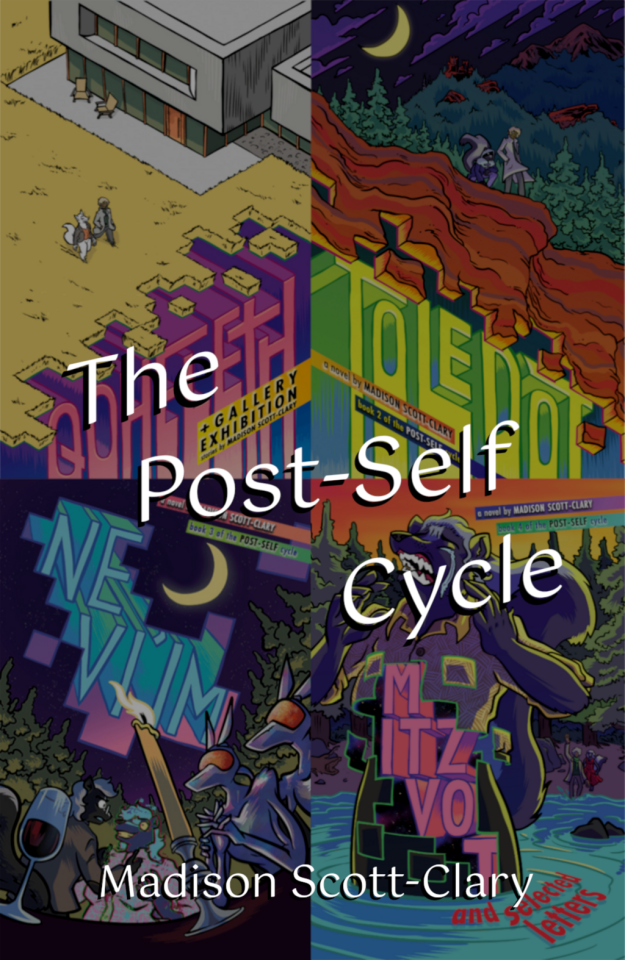
Did you know that I write a lot about memory, skunks, uploading consciousness, political maneuvering, skunks, aliens, skunks, queerness, identity, emotions, and skunks? It's true! I'm very proud of them. You can read books best described as
Given the chance to live forever in a world not built for death, what do you do?
Given the inability to forget—all your joys and sorrows, all your foundational memories and traumas—how do you cope?
Given the ability to create a full copy of yourself—down to every single one of those memories—to do as they will, to individuate and live out their own forever lives, or merge back down and meld their memories with your own, what paths do you take?
and
If I had a nickel for every time I accidentally wrote something with heavy plural undertones that I hadn't intended but nonetheless made me doubt my identity, I'd have two nickels! Which isn't a lot, but it is weird that it happened twice.
The Post-Self Cycle is a tetralogy of meta-furry¹, gender-weird sci-fi books. From the very beginning of the consensual dream of the System, the members of the Ode clade, all forks from the same core personality, have dealt with fear each in their own way. Do they search for greater ways to control their lives? Do they hunt for yet deeper emotional connection? Do they hone their art to the finest point?
From roots in political turmoil to the building of a new society, the story is there to be found, and the Bălan clade is there to tell it.
Digital versions come with illustrations from five artists — Iris Jay, Jade Laclede, Floe, CadmiumTea, and johnny a.
Available as paperbacks, ebooks, and free to read in the browser. Omnibus ebook and illustrated hardcovers coming soon!
Book I — Qoheleth
"All artists search. I search for stories, in this post-self age. What happens when you can no longer call yourself an individual, when you have split your sense of self among several instances? How do you react? Do you withdraw into yourself, become a hermit? Do you expand until you lose all sense of identity? Do you fragment? Do you go about it deliberately, or do you let nature and chance take their course?"
With immersive technology at its peak, it's all too easy to get lost. When RJ loses emself in that virtual world, not only must ey find eir way out, but find all the answers ey can along the way.
And, nearly a century on, society still struggles with the ramifications of those answers.
Features the bonus novella Gallery Exhibition: A Love Story.
Madison finds a way to address not only the joys and terrors of integrated simulation technology, but also tackles questions of gender and identity while telling a pretty gripping mystery story in the process.
— Nenekiri Bookwyrm
Book II — Toledot
"I am saying that you trust me — really trust me — and that life in the System is more subtle than I think you know. You let me into your dreams, my dear, and your dreams influence this place as much as, if not more than, your waking mind."
No longer bound to the physical, what lengths should one go to in a virtual world to ensure the continuity of one's existence?
Secession. Launch. Two separations from two societies, two hundred years apart. And through it all, so many parallels run on so many levels that it can be dizzying just keeping up. The more Ioan and Codrin Bălan learn, the more it calls into question the motivations of even those they hold most dear.
Madison Scott-Clary . . . trusts her readers to be able to understand a completely different culture and existence than our own, and makes it compelling to do so.
— Payson R. Harris
Book III — Nevi'im
"Do you know how old I am, Dr. Brahe? I am 222 years old, a fork of an individual who is...who would be 259 years old. I am no longer the True Name of 2124. Even remembering her feels like remembering an old friend. I remember her perfectly, and yet I do not remember how to be earnest. I do not know how to simply be."
The cracks are showing.
Someone picked up on the broadcast from the Dreamer Module and as the powers that be rush to organize a meeting between races, Dr. Tycho Brahe is caught up in a whirlwind of activity. And as always, when the drama goes down, there is Codrin Bălan to witness it.
When faced with eternity in a new kind of digital world, however, old traumas come to roost, and those who were once powerful are brought to their knees
Growth is colliding with memory, and the cracks are showing.
These characters are so well realized, so fleshed out, that I can’t help but to gush about how their interactions with each other inform the central plot of the book.
— Nenekiri Bookwyrm
Book IV — Mitzvot
"To be built to love is to be built to dissolve. It is to be built to unbecome. It is to have the sole purpose of falling apart all in the name of someone else."
Even the grandest of stories can feel small and immediate when it's just one person's life.
One of the most well-known names from one of the most well-known clades on the System, the avatar of political machinations and cool confidence, has been brought low. With help coming only from Ioan Bălan and the most grudging of support from her cocladists, all True Name has left to save herself is the ability to change.
Features the bonus novella Selected Letters.
Mitzvot drills down deeper into the lives of its characters and shows us that between the world-shattering projects that change the very understanding of the System, they’re just people trying to live their lives with love and purpose.
— Nenekiri Bookwyrm
Keep an eye out for Clade, an anthology of short stories from nine authors set in the universe, coming later this year.
----------
¹ That is, about members of the furry subculture rather than just furry characters.
158 notes
·
View notes
Text
Deltarune headcanon part 1


I always headcanon these lines as indicating that Kris could explore their gender identity more freely in the dark world than in the light world.
There is nothing indicating that the shirt they were is passed down clothes of Asriel to be honest it's probably just matching clothes like Chara in undertale but i like to headcanon it as mainly because i think it's a cool way to explore Kris's identity.

Like Kris is aware they are non binary but they don't really understand what their preferences in clothing are or how to explore their preferences or identity in a healthy manner because they were never taught those things in a healthy manner because of their past as the only human in the hometown.

I mainly say this because it's implied that Toriel didn't handle the whole being a human thing very properly it's not really implied that she actually talked to Kris about it properly and maybe even kinda tried to brush off the obvious issues despite clearly caring deeply about Kris.

She borrowed the how to take care of human book many times but right now there is no indication if she actually talked to Kris directly about them being human or not personally i don't think she did mainly because of the whole headband thing but it's also possible she did because Kris pranked Noelle with blood.

So idk could go either way in cannon but i headcanon it as Toriel not telling Kris and it led to them figuring it out on their own and i think it had a negative effect in them so when they discovered they were non binary so they don't like to discuss their complicated feelings with being non binary with Toriel because they feel like she will either brush it off or smother them with love without properly understanding their feelings.
Toriel still does her research and everything goat mom loves her non binary kid more than anything she borrows books to make sure gets everything right and gives anyone the look if they get Kris's pronouns wrong she loves her child very much and accepts their identity.
So Kris kinda finds peace in wearing their older brother's clothing it's nice and anything related to Asriel brings them comfort I think they hesitate to fully explore their identity because well they are the weirdo of the class and before deltarune they were bullied a lot and while yes they clearly like Susie and maybe some of the others as well i still think that being them being the weirdo of the class may have them felt hesitated to explore their identity it can be very scary to express yourself and put yourself through such a vulnerable position while also being the weirdo and the target of bullying i don't think Kris is afraid of not being seen as non binary since everyone seems to generally accept their identity but i can see Kris hesitating on exploring the full scope of their identity or figuring out their own style out of the fear humiliation it's one thing to seen as weird for your actions it's another thing where your trying to peruse something you personally find comfort and joy in and people laughing or just finding it weird it can be demotivating. However that's not the only thing that may make Kris hesitate on exploring their identity there is also fear of growing up


It's clearly implied Kris struggles with the fact that they are growing up and i think when applied to their gender it could be an interesting way to look at their character for a child when you are growing up you have to ask the big question like jobs, goals etc but when you are growing up you also have to consider your identity how you prefer to present yourself in society I like to think that Kris is not only gripping to their nostalgia because they miss the good old days when everything was fine but also because they are struggling with their identity and their place in the world back in their childhood they were just the younger sibling of Asriel and the weirdo kid but now they have to think about who they are and how they like to present themselves and that is terrifying to them.
Now this is where the dark world comes in the picture while the dark world isn't fictional narratively it is not reality either it's kinda far removed so Kris might have felt to be less embarassing to try and I like to think that Kris after gaining friendships and being exposed to such an environment slowly starts to explore their gender little by little starting chapter 2 with the take care outfit difference


I like to think Kris at the time of chapter 2 isn't ready to really go into the different gender clothing but they still decided to play around with different kinds of clothing just to try anyway you know baby steps.
Anyway that's just my headcanon feel free to disagree as I think in cannon Kris is probably very comfortable with their identity I just think the theme of escapism combined with Kris's gender identity as well as their identity as them being the only human in a town full of monsters could be really interesting hence the headcanon but yeah that's about it feels free to disagree as it's very far removed from cannon.
19 notes
·
View notes
Note
Would you think that leyndell is an absolute monarchy while Raya lucaria is a constitutional monarchy? And if so, should leyndell become constitutional as well in your opinion?
Interesting question! Since we only ever see either location in a post-collapse state it's difficult to tell for sure, but I'll give it my best shot.
Let's start with what we know of the government of Leyndell. Morgott is the current sovereign. He goes to the trouble of disguising his omen status, suggesting that he is not an absolute ruler -- there are other players who might try to depose him if his true identity were known.
The Roundtable hold had a place of prominence at some point. Given the fact that the Hold's architecture is much simpler, more defensively oriented, and stylistically distinct from the rest of Leyndell, it's possible that it was built in the period of upheaval following the Night of the Black Knives.
While the Confessors were likely either founded or greatly expanded during the opening years of the Shattering (as their primary objective seems to be hunting heretical Tarnished), I believe that Gideon functioned as Marika's spymaster long before her punishment within the Erdtree. Going off of the opening cinematic, he was long dead by the time Marika called the Tarnished, and he was an old man (despite the Guidance of Grace) when he died. The man is ancient.
He attempts to stop the Tarnished from becoming Elden Lord and continuing the cycle as the Elden Beast wishes, instead claiming that "Queen Marika has high hopes for us. That we continue to struggle, unto eternity." His loyalty to Marika was so great that he was willing to defy even the Greater Will. This (or his association with the Tarnished) is likely what led to his falling out with Morgott and the Hold in Leyndell being left abandoned.
We also know that Leyndell had (had) a sizeable aristocratic class. The wandering nobles, one of the game's most common low-level enemies, drop clothing bearing this description.
"Gown of soft cloth adorned with fine gold embroidery. Travel attire worn by nobles in the capital. Garb favored by the aged. Abandoning their birthplace after the Shattering, these undead wanderers are the pitiful product of unending life."
We also know that under Marika's rule, the Lands were broken into a series of small territories ruled by minor lords, such as the Maraises and the Haights. From the Ruler's Mask description:
Mask in the image of a wizened sage. Customary dress among lords in a smaller nation. Such a mask illustrates the qualities of an ideal lord: chiefly, wise and possessing a certain defanged geniality. One at the center of society often finds these qualities most expedient.
I think "defanged geniality" is the key phrase here. Early on, Marika seems to have run her newly acquired empire with something similar to the Satrap system.
We never (at least that I'm aware) encounter any mention of Marika actively campaigning in Altus, and we know that both Placidusax and his god suffered such a disastrous defeat that they both separately fled the Lands Between. My best guess would be that with their leaders gone, their former subjects surrendered to Marika without much of a fight (with a few notable exceptions, such as Gransax, the Storm Lord, and the Hero of Morne). Rather than being leveled and rebuilt from the ground up, these territories that surrendered peacefully would have been placed under the control of a regional governor and, at least initially, left more or less to their own devices.
There seems to have been a crackdown at some point, where Marika kneecapped the power of her old underlings and consolidated authority in the hands of her own personal religion. It seems to have happened at some point between Godfrey's banishment, her marriage to Radagon, the first burning of the Erdtree, and possibly the Gloam Eyed Queen's rebellion.
Long story short, we don't have a lot of hard info to go off of. But my best guess is that at the time immediately before the Shattering, Marika ruled over an empire managed (on paper) by largely impotent regional lords, with real power residing in the hands of the militant branches of the religion in which she was god and the pope was her husband.
As for the government of Liurnia, I posted a theory awhile back speculating on the subject.
In short, I think Rennala came to power riding the momentum of her victory over the Golden Order. She seems to have attracted a cadre of highly loyal followers (primarily the Carian Knights and the Lazuli Conspectus). There seems to have been an attempt to co-rule with the Glintstone scholars, but I've seen no evidence of the minor lords of Liurnia having much sway.
According to the descriptions of Greatblade Phalanx and the Troll Knight's Sword, Rennala was responsible for the favorable treatment of trolls within Liurnia (basically the only place we see them treated better than beasts of burden). We can also assume that albinaurirs were treated relatively well during her reign -- Loretta likely would not have followed her otherwise. It is also noteworthy that all albinaurics encountered in Caria Manor are mages, rather than the Caged or Insane variants.
This, along with her elevating the moon above the stars, would have put her out of step with the Glintstone scholars. The further I dig into their lore, the shadier they get. Potential crimes include genetically engineering a crippled slave race, making human sacrifices to the Primeval Current (link below), and contracting with the Cuckoo Mercenaries. According to the Raya Lucaria Soldier ash description, the Glintstone scholar's personal army was "were "given free rein by the academy to wage war as they pleased, and they were infamous for their rapacious ways."
So, once again going on 10% isolated data points and 90% plausible headcanon, Rennala seems to have been a reformer who couldn't get her new policies to stick with the population at large. Once A) the political capital gained by her victory over the Golden Order ran out, and B) the Glintstone scholars perceived weakness in her grief after Radagon's departure, she was cut off from her own government and de facto deposed rather quickly. I'm led to believe that Rennala didn't put down very deep roots in the Liurnian political landscape.
21 notes
·
View notes
Text
The Double Edged Sword: Suffering and Magic
On the innate link between magic and struggle, and deconstructing the concept of health and functionality.

This one is gonna contain a lot of me just blabbering about personal experience and mental health and how it relates to magic, do not read if you'll be annoyed by lots of personal anecdotes. This is very much a rant, not an essay.
A topic that frequently bounces off the walls of my brain and refuses to sit still until I give it my attention, is how culture and capitalism dictates our definition of sanity, and why mental illness usually leads to a special proclivity towards magic.
Deconstructing 'Health'
I distinctly remember the incessant feeling of not ever being helped by the people who were supposed to help, as a child in the mental healthcare system. People didn't listen to me, pumped me full of medications, and told me to plan my life better. When I got to be a teen and was asked how my ideal, perfect life would look, I was told that was unattainable and not necessary for me to be 'healthy'. If only at the time it had occurred to me that 'healthy' in the eyes of our western society doesn't mean ultimate wellness, it means peak performance in a 40-or-more-hour work week. Opposite the metaphorical wall of psychiatrists, psychologists and other mental health professionals were my Oma and the other anthroposophically inclined elders in my life. Equally loudly, they claimed there was nothing wrong with me at all - rather, I was something special to be venerated. The evidence of the New Age inbound, a child of some supernatural being, a psychic, a gifted child, able to talk to archangels on the behalf of cooing sexagenarian ladies. They, in turn, had no trust in anybody's ability to treat me, and perhaps also didn't want me to change; so they urged me not to ask for help. Ashwaghanda and meditation would be enough, they swear. Being saddled with all those contradictions in your early teens is traumatic enough. Being diagnosed with psychosis, dissociative identity disorder, and autism in college, right after you find your faith again, is a slap in the face.
So, naturally, discovering my limits, my definition of health and illness, and my joy, has been a process. Completely rejecting New Age spirituality was half of the work. Nowadays I refuse to interact or toy with the idea of star-seeds, Indigo Children, HSPs, arch-angels talking to me, and whatever else. But, being only fresh into magic at that time and still quite young, that left me with only its polar opposite to derive my definitions from: psychiatry. Obviously, psychiatry and psychology are very much lacking in my eyes. After all, I had only ever known mental health 'treatments' to be people with pills and authoritative voices to whip me back into shape for school. It took me a long time and a lot of religious introspection to find my own opinion about it, which is that they can exist at the same time and are just different interpretations of the same fact.
Long Night / Second Sight
As illustrated, our definition of health and sanity nowadays is very much dictated by capitalism, and secondarily by those around us. Similarly, the line between 'religion' and 'delusion' is very blurry, and very cultural, and sometimes not even relevant. Picture, for example, a young woman in the year 100 A.D.. Not married, and not soon to be married, as she is utterly eccentric in her ways, wildly defiant and very often completely unreasonable. She finds her place talking to other women of her community about all the things she fears will come to pass. They don't always come true, but often do, and when her anxiety is proven correct, all the women in her circle point to her and spread the word: "seeress." She survives by 'prophesying' to her community, in return for their reverence and donations. So no, there is no concrete line between belief (good): religion/spirituality, and belief (bad): delusion/insanity. Would you feel confident drawing a line between anxiety and 'real' foresight? Would that line be anywhere near the middle, or would you end up writing off most of your potential prophecies as overthinking?
The question to follow is 'what if it is prophecy?', and the answer is that really, that means nothing. Anything could be prophecy. Any delusion could become reality in an absurd enough string of events, any anxiety could come to pass, any bird passing overhead could be an omen and every number on every clock could be a sign. You shouldn't accept them as such, you'd become an awful nervous person. But it does serve to illustrate my point, which is that the difference is one you make yourself. For me, the difference is how I experience the magic in my daily life as opposed to how I experience my mental illness. Magic should feel organic, innately harmless, useful, directed. Mental illness feels scary, stressful, innately harmful, exhausting. I always see spirits, but I consider it mental illness when I obsessively chase them. I'm always open to signs, but I consider it mental illness when I cannot shake the idea that everything I see is somehow a sign, and it stresses me out.
So: my identity as a magical practitioner and my identity as an insane person are inseparable and sometimes identical. I was diagnosed with a number of mental illnesses that I'm fairly open about, and I have had a few psychotic breaks. I have used medication, and chosen to tough it out. And, notably: I have managed to synthesize certain symptoms into magical capability. I can leverage my anxiety into foresight, and my tendency to hallucinate into clairvoyance. My identity as mentally ill individual is not just imposed on me by myself though: it is also by mental health professionals, and more notably even by people in my circles. I get placed squarely in the 'unwell' category even by some other pagans for how deeply I believe in my gods and in magic. But because my belief doesn't affect my environment or myself negatively, I do not consider that to be mental illness.
The odds are good that if I was put on antipsychotics, I would be less spiritual. But I enjoy being spiritual.
Mental Illness and the Magical Practitioner
The idea that suffering, disability, and queerness in a person create a proclivity towards magic is reflected in Germanic pagan divinity, which is what I can speak the most confidently on. Odinn, of course, is the prime example. He sacrificed his eye, literally half of his sight, to gain complete wisdom about a type of magic normally only women were socially sanctioned to practice. This story seems kind of random and dismissible when you aren't familiar with magic in old Teutonic society and folklore, but when you learn that people with disabilities were often thought of as much more magically inclined, it makes sense. If you lacked an eye, or your sight, you had one eye (or your sight) in the Other World. If you limped, you had one foot in the Other World (or the grave, but how death relates to magical proficiency is a whole another can of worms). And this logic was applied to so many differences: vitiligo, deafness, muteness, lack of mobility, etc. And, of course, mental suffering is not the exception. Being strange, proclaiming terrifying prophecies, having an air of otherness, if it didn't get you killed, was almost certain to land you a position as magical practitioner for your community. Another idea I toy with regularly: what are the odds, really, that people who came from an unbroken line of magical practitioners serving a community, also came from a family with hereditary mental illnesses, such as schizophrenia?
Folk Magic as Struggle Magic
One reason that I don't find this idea to be such a stretch is also the role that magic had in the daily lives of historical people. As many who have dipped their toes into folk magic of any kind will know, folk magic wasn't usually acknowledged as magic by their cultures of origin. It was not a faith you could more or less choose to believe in, or an optional thing to engage in. There was barely a word for it at all, and it was as real and constant as dew in the mornings. I don't think I want to claim that people then were more mystically inclined, but I do believe people then were far more accustomed to having the local magical practitioner as a constant in their life. The witch doctor, the curandera, the cunning lady, the braucher, the shaman. This person fulfilled a crucial role in treating medical conditions, providing a listening ear and advice, offering comfort in times of need, guiding the community in their spirituality and even in delivering justice.
The magic of daily life wasn't just to siphon milk off your neighbors' stockpile or to protect yourself from evil, after all. It was also to protect your house from lightning, treat rashes, decide when to offer to the gods, et cetera. And it was as much science as it was what we would now consider spirituality: flushing out a wound with calendula officinalis tincture and using graveyard dirt to remove a wart were not two individual concepts. Therefore it would make sense that there was such an important slot to be filled by somebody eccentric. Folk magic was to reduce struggle, and the practitioners, in my heart of hearts, knew struggle well.
Intersectionality
I could never do this topic true justice without writing an entire book about it, and I do not have aspirations to write a book as of right now. Still, I would like to encourage you to consider all of the implications of this 'theory'; from how queerness and disability are related, how toxic masculinity and disability relate, and how disabled persons might be considered more feminine than others. Most importantly of all, I would like to encourage whoever may read this to consider how intricately connected oppression/suffering and magic are.
Closing Statements
This was definitely a rant, more than anything else. I struggled writing it, because many of these thoughts are thoughts that I am still having myself, so they are floating around loosely in my head, not quite willing to all piece together into a perfect picture yet. But I am using the opportunities I get to think and discuss about this as an excellent excuse to better myself and get closer to my Gods and my practice.
I hope that, if anybody does end up reading this despite the small size of my blog, you take away some food for thought from this, and perhaps feel encouraged to delve deeper into some of the gritty intersectionality of magic. These ideas are not just relevant to historical figures, they apply today! Look at the amount of people who practice magic of any kind nowadays, that identify as queer and/or disabled. Look at how many people nowadays turn to magic because they came from a traumatic past under Christianity, or because they felt like they had no control over their lives otherwise, or because they connected to the fellow 'weird' kids in school who played DnD and read fantasy books. If that's you, or you are like those people, and you found magic because of suffering, it's you I am writing about, as much as I'm also writing about the Oracle of Delphi.
I wish everybody who found magic through struggle the very best in their journey of balancing those two things, and I hope nobody takes this post to mean that you shouldn't seek treatment when you are unwell. Only that you deserve to experience magic as much as you deserve to experience joy. ---- If you enjoy my work, please consider purchasing or commissioning some of my written resarch, ordering a reading, or commissioning my art. Click here to see the options. Thank you!
#apothecaric allerlei#folk magic#folk witchcraft#inclusive heathenry#paganism#mental health#magic#disability#intersectionality#witchblr#I may actually write a serious essay about this one day
8 notes
·
View notes